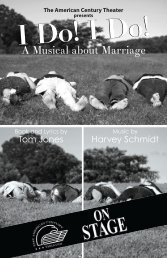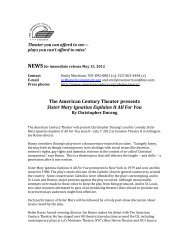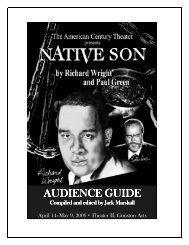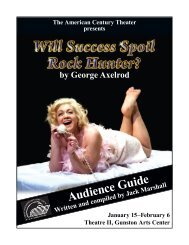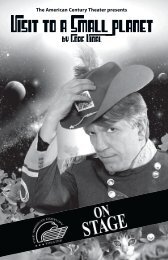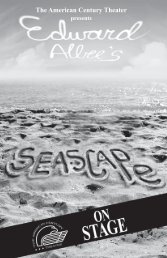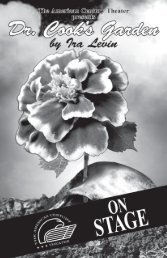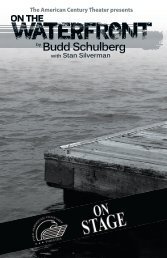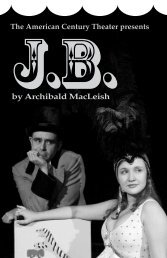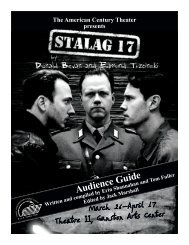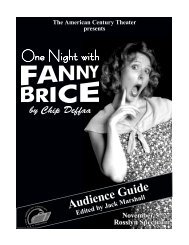Visit to a Small Planet - The American Century Theater
Visit to a Small Planet - The American Century Theater
Visit to a Small Planet - The American Century Theater
Create successful ePaper yourself
Turn your PDF publications into a flip-book with our unique Google optimized e-Paper software.
Audience GuideWritten and compiled by Jack MarshallJuly 8–August 6, 2011<strong>The</strong>atre Two, Guns<strong>to</strong>n Arts Center
<strong>The</strong>ater you can afford <strong>to</strong> see—plays you can’t afford <strong>to</strong> miss!About <strong>The</strong> <strong>American</strong> <strong>Century</strong> <strong>The</strong>ater<strong>The</strong> <strong>American</strong> <strong>Century</strong> <strong>The</strong>ater was founded in 1994. We are a professional companydedicated <strong>to</strong> presenting great, important, but overlooked <strong>American</strong> plays of the twentiethcentury . . . what Henry Luce called ―the <strong>American</strong> <strong>Century</strong>.‖<strong>The</strong> company’s mission is one of rediscovery, enlightenment, and perspective, notnostalgia or preservation. <strong>American</strong>s must not lose the extraordinary vision and wisdomof past playwrights, nor can we afford <strong>to</strong> surrender our moorings <strong>to</strong> our shared culturalheritage.Our mission is also driven by a conviction that communities need theater, and theaterneeds audiences. To those ends, this company is committed <strong>to</strong> producing plays thatchallenge and move all <strong>American</strong>s, of all ages, origins and points of view. In particular,we strive <strong>to</strong> create theatrical experiences that entire families can watch, enjoy, anddiscuss long afterward.<strong>The</strong>se audience guides are part of our effort <strong>to</strong> enhance the appreciation of these works,so rich in his<strong>to</strong>ry, content, and grist for debate.<strong>The</strong> <strong>American</strong> <strong>Century</strong> <strong>The</strong>ater is a 501(c)(3) professional nonprofit theater companydedicated <strong>to</strong> producing significant 20th <strong>Century</strong> <strong>American</strong> plays and musicals at risk ofbeing forgotten.<strong>The</strong> <strong>American</strong> <strong>Century</strong> <strong>The</strong>ater is supported in part by Arling<strong>to</strong>n County through theCultural Affairs Division of the Department of Parks, Recreation, and CulturalResources and the Arling<strong>to</strong>n Commission for the Arts.This arts event is made possible in part by the Virginia Commission on the Arts and theNational Endowment for the Arts, as well as by many generous donors.
Contents<strong>The</strong> Playwright: Gore Vidal (b. 1925) . . . . . . . . . . . . . . . . . . . . . . . . . . . . . 1A Fish Called Kre<strong>to</strong>n:<strong>Visit</strong> <strong>to</strong> a <strong>Small</strong> <strong>Planet</strong> and the ―Fish Out of Water‖ Comedy . . . . . . . . . . . 5<strong>The</strong> Battle of Manassas, or First Bull Run . . . . . . . . . . . . . . . . . . . . . . . . . . 7A Tale of Three Kre<strong>to</strong>ns, by Jack Marshall . . . . . . . . . . . . . . . . . . . . . . . . . 8<strong>The</strong> <strong>American</strong> Oscar Wilde . . . . . . . . . . . . . . . . . . . . . . . . . . . . . . . . . . . . 11
<strong>The</strong> Playwright: Gore Vidal (b. 1925)Novelist, playwright, essayist, pundit, iconoclast, wit—Gore Vidal has beenone of the most interesting, versatile, prolific, and entertaining men of letterson the <strong>American</strong> scene for six decades.Eugene Luther Gore Vidal was born at West Point, New York. Heeventually shortened his name <strong>to</strong> the catchier, edgier Gore Vidal. He wasborn in<strong>to</strong> wealth, influence, and accomplishment: His father became one ofthe pioneers of commercial aviation in the United States, involved in thefounding of TWA and Eastern and Northeastern Airlines. <strong>The</strong> elder Vidalwould also serve as Direc<strong>to</strong>r of Air Commerce in the administration ofFranklin Roosevelt. His mother, Nina, was the daughter of U.S. Sena<strong>to</strong>rThomas Pryor Gore of Mississippi.After divorcing Eugene Vidal, Sr., Nina Gore married financier Hugh D.Auchincloss. Young Gore Vidal went <strong>to</strong> live with the couple at Merrywood,Auchincloss’s vast estate in Northern Virginia. His life of pricey boardingschools ended after his graduation from one of the ritziest, Phillips ExeterAcademy in New Hampshire. <strong>The</strong> 17-year-old enlisted in the United StatesArmy <strong>to</strong> fight in World War II.Vidal was assigned <strong>to</strong> duty as a warrant officer on a transport ship in theAleutian Islands, where his ship encountered a fierce arctic s<strong>to</strong>rm, known <strong>to</strong>the native Aleuts as a williwaw. While recuperating from his injuries inmilitary hospitals, he wrote his first novel, Williwaw, completed when hewas 19 and published when he was 20. After his discharge from the army in1946, Vidal joined the literary life of New York City. His second novel, In aYellow Wood, about the dilemmas of a returning veteran, was well received,but Vidal began what would be a lifetime pattern by leaving the country, thistime <strong>to</strong> Guatemala, where he believed he could commune with his Musewith fewer distractions.His third novel, <strong>The</strong> City and the Pillar, portrayed homosexual relationshipssympathetically and as natural. Thus Vidal, who is gay, confronted a tabooin <strong>American</strong> literature, for the <strong>to</strong>pic of homosexuality had always beentreated as solely a subject of shame. For the first time but definitely not thelast, Vidal was condemned as immoral and treated as a pariah. <strong>The</strong> New York1
Times, for example, refused <strong>to</strong> review Vidal’s subsequent books for almost adecade; some publications even refused <strong>to</strong> print his name, much less reviewhis books. His fourth novel, A Season of Comfort, was sabotaged by a near<strong>to</strong>talblacklisting by the mainstream press.Vidal, defiant and unbowed, traveled between New York and Europe, wherehis work was more charitably received. More novels came, on a variety ofsubjects. A Search for the King revisited a medieval legend. Dark Green,Bright Red portrayed an <strong>American</strong>-led coup in Central America. In 1953 hepublished his most successful and acclaimed novel <strong>to</strong> that point, <strong>The</strong>Judgment of Paris, setting a contemporary s<strong>to</strong>ry against themes fromclassical antiquity. Widening his range <strong>to</strong> futuristic fantasy, his 1955 novelMessiah <strong>to</strong>ld the tale of a dicta<strong>to</strong>r who rises <strong>to</strong> power in the United States byexploiting the new medium of television. Still Vidal was scorned in the U.S.,but he was on his way back.He bought a large house on the Hudson River in Dutchess County, NewYork. Needing money <strong>to</strong> pay for the estate, he resorted <strong>to</strong> commercialfiction, writing a series of mysteries under the pseudonym Edgar Box. Sincethey were neither serious nor attributed <strong>to</strong> Gore Vidal, the Box mysterieswere very well received by critics. Next, Vidal moved in<strong>to</strong> the new mediumof television, which had fascinated him from its beginnings.In just a few years, Vidal was <strong>to</strong> write twenty live television dramas andjoined Paddy Chayefsky, Rod Serling, Reginald Rose, and Abby Mann inthe select group of great early television dramatists. Vidal scored his mostnotable success with an original fantasy-satire, <strong>Visit</strong> <strong>to</strong> a <strong>Small</strong> <strong>Planet</strong>. Hethen adapted <strong>Visit</strong> <strong>to</strong> a <strong>Small</strong> <strong>Planet</strong> for the Broadway stage and had a hit inhis first foray in<strong>to</strong> playwriting.Like Chayefsky and Serling, Vidal was asked <strong>to</strong> appear as a guest on thenew TV talk shows like Today and <strong>The</strong> Tonight Show, where he was afavorite of host Jack Paar. He was a natural: dashing and handsome, with aperformer’s flair, a mellifluous voice, sly wit, a gift for mimicry, and anendless supply of wry observations about sex, politics, show business, andevery other subject. Soon he was one of the most popular members on theTV talk show guest list.Vidal detested the film adaptations of <strong>Visit</strong> <strong>to</strong> a <strong>Small</strong> <strong>Planet</strong> (starring JerryLewis as the space man) and his Billy-the-Kid drama, Left-Handed Gun(starring Paul Newman as Billy) and resolved <strong>to</strong> learn about the movie2
usiness. He accepted an offer <strong>to</strong> write for Metro-Goldwyn-Mayer andconquered Hollywood, writing acclaimed screenplays for <strong>The</strong> Catered Affair(based on a play by Paddy Chayefsky), Suddenly Last Summer (based on aplay by his close friend Tennessee Williams), and J’Accuse, about thefamous Dreyfus case.He also worked as an uncredited script doc<strong>to</strong>r on the epic film Ben Hur, inwhich, some believe, he enhanced homoerotic under<strong>to</strong>nes in the relationshipbetween Messala and Ben Hur. (Charl<strong>to</strong>n Hes<strong>to</strong>n denied that suchunder<strong>to</strong>nes existed, which amused Vidal no end.)Broadway and Hollywood had given him financial freedom, but, just as hewas prepared <strong>to</strong> plunge back in<strong>to</strong> serious writing, a new world, or rather anold one that he had neglected, called out for his attention: politics.When Vidal’s mother divorced Hugh D. Auchincloss in the 1940s,Auchincloss married Janet Lee Bouvier, whose daughter, Jacqueline,married Massachusetts Sena<strong>to</strong>r John F. Kennedy, then preparing <strong>to</strong> run forthe presidency. JFK was eager <strong>to</strong> meet his wife’s famous literary relative,and soon Gore Vidal was immersed in the heady environment of high-stakespolitics, Kennedy style. His experiences spawned the Broadway hit <strong>The</strong> BestMan, a comic drama about the intrigues at a presidential nominatingconvention.Vidal was so absorbed in politics that he ran for Congress himself, losing ina Republican district but drawing unexpectedly strong support. His interestin politics was shattered by Kennedy’s assassination, however, and hemoved, or escaped, <strong>to</strong> Italy <strong>to</strong> work on the novel Julian, about the fourthcenturyRoman Emperor who attempted <strong>to</strong> turn the Empire away from itsofficial Christianity and back <strong>to</strong> the ancient traditions of Greek philosophy.<strong>The</strong> book was a triumph and <strong>to</strong>pped the best-seller lists in 1964.<strong>The</strong> 1967 novel Washing<strong>to</strong>n, D.C. followed a set of invented charactersthrough the changing political atmosphere of the city from the New Deal <strong>to</strong>the Cold War. <strong>The</strong> following year, Vidal attacked sexual conventions againwith Myra Breckenridge, about a beautiful transexual’s adventures. It waslater made in<strong>to</strong> a film starring Raquel Welch and Rex Reed and supplantedthe film of <strong>Visit</strong> <strong>to</strong> a <strong>Small</strong> <strong>Planet</strong> as Vidal’s least favorite movie version ofone of his works.3
Vidal returned <strong>to</strong> his fictional chronicle of <strong>American</strong> his<strong>to</strong>ry with the 1973novel Burr, which many consider his masterpiece. In 1876, set against thebackdrop of the disputed presidential election of the nation’s centennial year,Vidal continued the political and cultural his<strong>to</strong>ry theme and carried itthrough with Lincoln, Empire, Hollywood, and <strong>The</strong> Golden Age, followingseveral generations of related families through nearly two centuries of the<strong>American</strong> journey. <strong>The</strong>se Vidal alternated with more satirical works, likeDuluth, <strong>The</strong> Smithsonian Institution, Live from Golgotha, and Creation,which follows its protagonist from Persia <strong>to</strong> Athens <strong>to</strong> India and China andexplores the origins of some of the world’s major religions.Vidal also wrote many essays on politics and literature in magazines like<strong>The</strong> New Yorker, Playboy, Esquire, and <strong>The</strong> New York Review of Books.Every decade, Vidal has collected his essays in best-selling collections likeRocking the Boat, Sex, Death, and Money, Homage <strong>to</strong> Daniel Shays, Mattersof Fact and Fiction, and At Home. A collection of 40 years of his work inthe essay medium, United States: Collected Essays 1952-1992, won theNational Book Award in 1993.From his opposition <strong>to</strong> the Vietnam War in the 1960s <strong>to</strong> his opposition <strong>to</strong> theIraq war, Vidal has been one of his country’s most outspoken, liberal, andpessimistic social critics. In 1982, Vidal even ran for the U.S. Senate inCalifornia but was defeated in the Democratic primary then- and now-Governor Jerry Brown.Vidal maintained his apartment in Rome and a villa in Ravello on the AmalfiCoast, while maintaining a home in the Hollywood Hills. He dabbled as anac<strong>to</strong>r in films, playing a sinister conservative Sena<strong>to</strong>r in Bob Roberts. Whenhis longtime companion Howard Austen died in 2003, Vidal left Italy andreturned <strong>to</strong> Los Angeles.Vidal says he has given up writing novels, but he has published two volumesof memoirs, Palimpsest (1995) and Point <strong>to</strong> Point Navigation (2006). He hasalso published a study of the Founding Fathers, Inventing a Nation:Washing<strong>to</strong>n, Adams, Jefferson (2003). He continues <strong>to</strong> write book-lengthessays on political <strong>to</strong>pics, such as Dreaming War and Imperial America.4
A Fish Called Kre<strong>to</strong>n: <strong>Visit</strong> <strong>to</strong> a <strong>Small</strong> <strong>Planet</strong>and the “Fish Out of Water” Comedy—Jack Marshall<strong>Visit</strong> <strong>to</strong> a <strong>Small</strong> <strong>Planet</strong> is many things: Cold War satire, light-hearted highjinx, science fiction comedy, and romantic comedy with a twist. Its genre,however, is classic ―fish out of water,‖ a fictional device that creates bothcomic situations and dramatic tensions from situations arising out of acentral character being thrust in<strong>to</strong> unfamiliar, indeed alien, places andcultures.It is one of the most enduring and versatile of themes, and Vidal’s play couldstand as its epi<strong>to</strong>me. After all, an alien from outer space landing in NorthernVirginia could actually be a fish, or at least a fish-man. <strong>The</strong> closest acomedy ever came <strong>to</strong> taking fish out of water literally was probably RonHoward’s Splash, the movie that made Tom Hanks a star. Its protagonistwas a mermaid, who is only half a fish.If you don’t count King Lear, Shakespeare’s fish-out-of-water tragedy, thefirst great fish-out-of-water classic was probably Gulliver’s Travels,Jonathan Swift’s 1726 novel about a bold explorer who visits strange landslike Lilliput, where he’s a giant among the tiny locals, and Brobdingnag,where he’s tiny in comparison <strong>to</strong> a population of giants. <strong>The</strong> genre wasperfected about a century and a half later by Lewis Carroll, who wassomething of a fish out of water himself, with Alice’s Adventures inWonderland (commonly shortened <strong>to</strong> Alice in Wonderland) in 1865. Thisadult book disguised as a children’s book, and its sequel, Through theLooking Glass, embody all the traditional features of a fish-out-of-waters<strong>to</strong>ry: confusion; suspense (Will the out-of-place character survive oradapt?); odd characters; misunderstandings due <strong>to</strong> different cultures, uses oflanguage, and ways of thinking; and the exploitation of the main character’sdisplaced setting <strong>to</strong> raise satirical, metaphorical, and allegorical issues.Other classic novels have used the fish-out-of-water theme. It was a favoritedevice of Charles Dickens (Oliver Twist) and Mark Twain (A ConnecticutYankee in King Arthur’s Court, <strong>The</strong> Prince and the Pauper), and, as we allknow, Frank L. Baum’s <strong>The</strong> Wizard of Oz is one of the most popular of allfish-out-of-water s<strong>to</strong>ries.5
Fish-out-of-water comedies are a major subcategory, because the bare plotsof such s<strong>to</strong>ries often lay the foundation for laughs even before anythinghappens. Consider: An English butler is won in a poker game by a cowboy in the wild<strong>American</strong> West (Ruggles of Red Gap). A witch tries <strong>to</strong> settle down as a suburban housewife (I Married aWitch; Bewitched). A street thug switches places in life with an Ivy League commoditiesbroker (Trading Places). A s<strong>to</strong>rybook princess is magically relocated in real life New YorkCity (Enchanted). A family of monsters and ghouls moves in<strong>to</strong> a normal neighborhood(<strong>The</strong> Addams Family; <strong>The</strong> Munsters). A teenage high school student discovers that she is a vampire slayer(Buffy the Vampire Slayer). A child is stuck in an adult’s body, or vice versa (Big; Freaky Friday). An unprepared, unqualified individual is mistaken for a powerfulfigure (Bananas; Dave; Being <strong>The</strong>re). A time machine sends someone <strong>to</strong> a completely different era (Back <strong>to</strong>the Future; Time after Time). Someone is forced <strong>to</strong> live as the opposite sex (Tootsie; BosomBuddies, Switch). People used <strong>to</strong> being poor are suddenly thrust in<strong>to</strong> wealth (<strong>The</strong>Beverly Hillbillies; <strong>The</strong> Jeffersons; about half of all Shirley Templemovies).<strong>The</strong> variations are endless, but all have the same basic dilemma at heart:someone ends up where he doesn’t belong. Feeling out of place is a periodictrauma in everyone’s life, so the situation, even when far-fetched orfantastic, creates immediate sympathy and a connection <strong>to</strong> the maincharacter. For who among us hasn’t felt like a fish out of water?On the stage, the comic possibilities of watching a hero cope with a strangeand hostile environment have created some of Broadway’s most successfulcomedies, from Arsenic and Old Lace (sane drama critic finds himself thrustin<strong>to</strong> a house full of serial killers and crazies), <strong>to</strong> No Time for Sergeants(clueless hillbilly confounds the U.S. Army) <strong>to</strong> <strong>The</strong> Foreigner. Gore Vidal’sbasic plot for <strong>Visit</strong> <strong>to</strong> <strong>Small</strong> <strong>Planet</strong> has an added bonus while using the―space alien visits 1950s Virginia thinking he is going <strong>to</strong> see the Civil War‖6
set up, by having Kre<strong>to</strong>n, his space alien hero, have the equivalent ofmagical powers. He can read minds and control the movement of objectsanywhere in the world; unlike most fish out of water, he isn’t disadvantagedby his new environment but made more powerful by it. (Yes, Superman is afish out of water.) This fish-out-of-water…with-benefits! twist is yet anothersubgenre and one tailor-made for theatrical purposes, allowing for specialeffects and sight gags galore.So popular was Vidal’s variation on the classic theme that it quicklyspawned many imitations and adaptations, especially on television, whichhas always been a fertile field for fish-out-of-water plots. In addition <strong>to</strong>Bewitched (which was really a double fish-out-of-water set up: Samantha thewitch has <strong>to</strong> cope with suburbia, and Darren, her hapless mortal hubby,periodically finds himself surrounded by witches, warlocks, wizards,leprechauns, and other assorted magicmakers who act as if he is the strangeone), there was I Dream of Jeannie (with a shapely Barbara Eden standing infor Kre<strong>to</strong>n, and a genie’s bottle replacing his flying saucer), and especiallyMy Favorite Martian, a rip off if there ever was one. Ray Wals<strong>to</strong>n’s Martianvisi<strong>to</strong>r, like Kre<strong>to</strong>n, conversed with animals and used his superior brain <strong>to</strong>read minds and engage in telekinesis. Why Vidal didn’t sue, I’ll never know.<strong>The</strong> Battle of Manassas, or First Bull RunKre<strong>to</strong>n comes <strong>to</strong> Northern Virginia in 1957 thinking he is going <strong>to</strong> see theBattle of Manassas. Here is what he missed.<strong>The</strong> first major battle of the <strong>American</strong> Civil War occurred on July 21, 1861,in and around what is now Fairfax and Prince William Counties. 28,450Northern troops and 32,230 Confederate troops battled under the commandsof Brig. Gen. Irvin McDowell for the Union and Brig. Gen. Joseph E.Johns<strong>to</strong>n and Brig. Gen. P. T. Beauregard for the Confederacy. It wasJohns<strong>to</strong>n’s arrival on the scene with Southern reinforcements that turned aYankee vic<strong>to</strong>ry in<strong>to</strong> an embarrassing defeat.On July 16, 1861, the untried Union army under Brig. Gen. McDowellmarched from Washing<strong>to</strong>n against the Confederate army, which was drawnup behind Bull Run beyond Centreville.7
On the 21st, McDowell crossed at Sudley Ford and attacked the Confederateleft flank on Matthews Hill. Fighting raged throughout the day asConfederate forces were driven back <strong>to</strong> Henry Hill. Late in the afternoon,the Confederate reinforcements (one brigade arriving by rail from theShenandoah Valley) extended and broke the Union right flank. <strong>The</strong> Federalretreat rapidly deteriorated in<strong>to</strong> a panic and rout. Many civilians who hadtravelled up from Washing<strong>to</strong>n, D.C. by horse and carriage had <strong>to</strong> flee <strong>to</strong>safety.Although vic<strong>to</strong>rious, Confederate forces were <strong>to</strong>o disorganized <strong>to</strong> pursue theretreating Union army. Confederate Gen. Barnard Bee and Col. Francis S.Bar<strong>to</strong>w were killed. Thomas J. Jackson earned the nickname ―S<strong>to</strong>newall‖during the battle, for the way his men held their ground for hours despite afurious Union attack.<strong>The</strong> Union had 2,950 casualties; the Confederacy, only 1,750.<strong>The</strong> battle convinced the Lincoln administration that the war would be along and costly affair. As a result of his poor performance, Brig. Gen.McDowell was relieved of command of the Union army and replaced byMaj. Gen. George B. McClellan, who set about reorganizing and training thetroops.A Tale of Three Kre<strong>to</strong>ns—Jack Marshall<strong>The</strong> best way <strong>to</strong> get a sense of how Gore Vidal regarded the character ofKre<strong>to</strong>n, the visi<strong>to</strong>r from outer space in <strong>Visit</strong> <strong>to</strong> a <strong>Small</strong> <strong>Planet</strong>, is <strong>to</strong> look atthe ac<strong>to</strong>rs who played him on the stage.<strong>The</strong> part was created by Australian ac<strong>to</strong>r Cyril Ritchard---a tall, NoelCowardish ac<strong>to</strong>r with a huge, expressive face, a comically fussy manner, anda slight hint of menace. A lucky pairing with the already established theatreactress Madge Elliott in 1918 had been a triumph onstage and off, as thetwosome married and became known as ―<strong>The</strong> Musical Lunts‖ by performingin scores of plays and revues <strong>to</strong>gether. Legendary for his preening, prancing,cackling villain Captain Hook in the award-winning stage and TV musical8
Good for Lewis, bad for Gore Vidal’s play. Where Ritchard and Green wereBritish, he was screamingly <strong>American</strong>. While they had demeanors of maturewisdom and restraint, Lewis, as always in those years, displayed the basicattitudes and behaviors of a hyperactive 9-year-old, and a 9-year-old whohad sustained a serious closed head injury at that. Ritchard and Greenappeared smarter than the Earthlings; Jerry’s Kre<strong>to</strong>n was dumber andstranger: a big kid in a six-foot body.<strong>The</strong> screenplay, of course, was altered <strong>to</strong> give this Kre<strong>to</strong>n opportunities <strong>to</strong> doJerry Lewis–like slapstick—Kre<strong>to</strong>n gets drunk and starts walking on theceiling, that sort of thing. <strong>The</strong>re could be no menace in his portrayal, andmost of the subtext Vidal intended <strong>to</strong> convey was lost. It was as if the part ofE.T. had been cast with Elmo . . . or Alf. What was once subtle becamevulgar. <strong>The</strong> ending, meanwhile, is neither a surprise nor ironic when Kre<strong>to</strong>nis played like a, well, cretin.While the Ritchard-Green version of Kre<strong>to</strong>n was preserved in Ray Wals<strong>to</strong>n’serudite extraterrestrial visi<strong>to</strong>r in the 1960s TV homage <strong>to</strong> <strong>Visit</strong>, My FavoriteMartian, the Lewis-style alien had legs, <strong>to</strong>o. When direc<strong>to</strong>r Gary Marshallwas furiously spinning off sitcoms from the post–shark jumping HappyDays, he <strong>to</strong>ok a visiting spaceman who appeared in one forgettable episode(it turned out <strong>to</strong> be only Richie’s dream) and concocted a <strong>Visit</strong> <strong>to</strong> a <strong>Small</strong><strong>Planet</strong> scenario that set him down in Boulder, Colorado. <strong>The</strong> ac<strong>to</strong>r cast <strong>to</strong>play the new Kre<strong>to</strong>n in <strong>to</strong>wn was improvisational comic Robin Williams, avery different kind of comedian from Jerry Lewis but equally chaotic andchildlike.In Mork and Mindy, an alien’s egg-shaped spacecraft lands on Earth <strong>to</strong>observe human behavior. <strong>The</strong> alien Mork (Williams) has been sent <strong>to</strong> Earth<strong>to</strong> get him off the planet Ork, which has banned humor. Mork dresses inEarth clothing, a suit, which he ignorantly wears backwards. He befriends21-year-old Mindy (Pam Dawber), who asks him who he really is. <strong>The</strong>innocent Mork, not knowing about the Earth practice of lying, tells her thetruth.S<strong>to</strong>rylines centered on Mork’s attempts <strong>to</strong> understand human behavior and<strong>American</strong> culture as Mindy helped him <strong>to</strong> adjust <strong>to</strong> life on Earth. At the endof each episode, Mork reported back <strong>to</strong> Ork on what he had learned aboutEarth cus<strong>to</strong>ms. If he weren’t so angry about Jerry Lewis, Gore Vidal mighteven have approved.10
<strong>The</strong> <strong>American</strong> Oscar WildeWhen Gore Vidal was informed in his Italian villa that long-time literary foeTruman Capote had died, he is reported <strong>to</strong> have said, “Hmmm. Good careermove.” Vidal is one of those writers, like W.S. Gilbert, Mark Twain, andOscar Wilde, who can manufacture a memorable witticism or epigram atwill; one wonders what wonderful quotes posterity has missed that nobodyin his presence bothered <strong>to</strong> record.Vidal has quipped about everything—sex, politics, his<strong>to</strong>ry, love, America,television, writing. If he is not quite Wilde’s equal in quality (Wilde’s bestwitticisms are less mordant and more whimsical than Vidal’s), he certainlymeets him in pure volume of well-phrased and provocative observations.<strong>The</strong>se are just a sampling.“Style is knowing who you are, what you want <strong>to</strong> say and not giving adamn. ''“A good deed never goes unpunished.”“A narcissist is someone better looking than you are.”“All children alarm their parents, if only because you are foreverexpecting <strong>to</strong> encounter yourself.”“All in all, I would not have missed this century for the world.”“Any <strong>American</strong> who is prepared <strong>to</strong> run for president shouldau<strong>to</strong>matically, by definition, be disqualified from ever doing so.”“Apparently, a democracy is a place where numerous elections are heldat great cost without issues and with interchangeable candidates.”“As societies grow decadent, the language grows decadent, <strong>to</strong>o. Wordsare used <strong>to</strong> disguise, not <strong>to</strong> illuminate, action: you liberate a city bydestroying it. Words are <strong>to</strong> confuse, so that at election time people willsolemnly vote against their own interests.”“As the age of television progresses, the Reagans will be the rule, not the11
exception. To be perfect for television is all a President has <strong>to</strong> be thesedays.”“By the time a man gets <strong>to</strong> be presidential material, he‟s been boughtten times over.”“Democracy is supposed <strong>to</strong> give you the feeling of choice, like PainkillerX and Painkiller Y. But they‟re both just aspirin.”“Every time a friend succeeds, I die a little.”“Half of the <strong>American</strong> people have never read a newspaper. Half nevervoted for President. One hopes it is the same half.”“I never miss a chance <strong>to</strong> have sex or appear on television.”“I‟m all for bringing back the birch, but only between consentingadults.”“Never have children, only grandchildren.”“In America, the race goes <strong>to</strong> the loud, the solemn, the hustler. If youthink you‟re a great writer, you must say that you are.”“In writing and politicking, it‟s best not <strong>to</strong> think about it, just do it.”“It is not enough <strong>to</strong> succeed. Others must fail.”“It is the spirit of the age <strong>to</strong> believe that any fact, no matter how suspect,is superior <strong>to</strong> any imaginative exercise, no matter how true.”“In almost every case (where the United States has fought wars) ouroverwhelming commitment <strong>to</strong> freedom, democracy, and human rightshas required us <strong>to</strong> support those regimes that would deny freedom,democracy and human rights <strong>to</strong> their own people.”“Love is a fan club with only two fans.”“I am an obsessive rewriter, doing one draft and then another and12
another, usually five. In a way, I have nothing <strong>to</strong> say but a great deal <strong>to</strong>add.”“I suspect that one of the reasons we create fiction is <strong>to</strong> make sexexciting.”“Until the rise of <strong>American</strong> advertising, it never occurred <strong>to</strong> anyoneanywhere in the world that the teenager was a captive in a hostile worldof adults.”“For half a century, pho<strong>to</strong>graphy has been the „art form‟ of theuntalented. Obviously some pictures are more satisfac<strong>to</strong>ry than others,but where is credit due? To the designer of the camera? To the finger onthe but<strong>to</strong>n? To the law of averages?”“<strong>The</strong> idea of a good society is something you do not need a religion andeternal punishment <strong>to</strong> buttress; you need a religion if you are terrifiedof death.”“<strong>The</strong> genius of our ruling class is that it has kept a majority of thepeople from ever questioning the inequity of a system where mostpeople drudge along, paying heavy taxes for which they get nothing inreturn.”“<strong>The</strong>re is no human problem which could not be solved if people wouldsimply do as I advise.”“How marvelous books are, crossing worlds and centuries, defeatingignorance and, finally, cruel time itself.”“If one starts with the ana<strong>to</strong>mical difference, which even a patriarchalViennese novelist was able <strong>to</strong> see was destiny, then one begins <strong>to</strong>understand why men and women don‟t get on very well withinmarriage, or indeed in any exclusive sort of long-range sexualrelationship. He is designed <strong>to</strong> make as many babies as possible with asmany different women as he can get his hands on, while she is designed<strong>to</strong> take time off from her busy schedule as astronaut or role model <strong>to</strong> layan egg and bring up the result. Male and female are on different sexualtracks, and that cannot be changed by the Book or any book. Since allour natural instincts are carefully perverted from birth, it is no wonder13
that we tend <strong>to</strong> be, if not all of us serial killers, killers of our own truenature.”“What other culture could have produced someone like Hemingway andnot seen the joke?”“<strong>The</strong> corporate grip on opinion in the United States is one of thewonders of the Western world. No First World country has evermanaged <strong>to</strong> eliminate so entirely from its media all objectivity—muchless dissent.”“Litigation takes the place of sex at middle age.”“ „Liberal‟ comes from the Latin liberalis, which means pertaining <strong>to</strong> afree man. In politics, <strong>to</strong> be liberal is <strong>to</strong> want <strong>to</strong> extend democracythrough change and reform. One can see why that word had <strong>to</strong> beerased from our political lexicon.”“If most men and women were forced <strong>to</strong> rely upon physical charm <strong>to</strong>attract lovers, their sexual lives would be not only meager but in ayouth-worshiping country like America, painfully brief.”“He will lie even when it is inconvenient, the sign of the true artist.”“I'm a born-again atheist.”“I don‟t want anything. I don‟t want a job. I don't want <strong>to</strong> berespectable. I don‟t want prizes. I turned down the National Institute ofArts and Letters when I was elected <strong>to</strong> it in 1976 on the grounds that Ialready belonged <strong>to</strong> the Diners Club.”14
We’re glad you joined us for<strong>Visit</strong> <strong>to</strong> a <strong>Small</strong> <strong>Planet</strong>!Consider a subscription <strong>to</strong> our2011−2012 season!Subscribers get:Great pricesEasy ticket exchangeReserved seatsComplimentary audience guidesSpecial offersSign up for our mailing list <strong>to</strong> learn abou<strong>to</strong>ur soon-<strong>to</strong>-be-announced 2011–2012 season.<strong>Visit</strong> us on the web at www.<strong>American</strong><strong>Century</strong>.org,15



